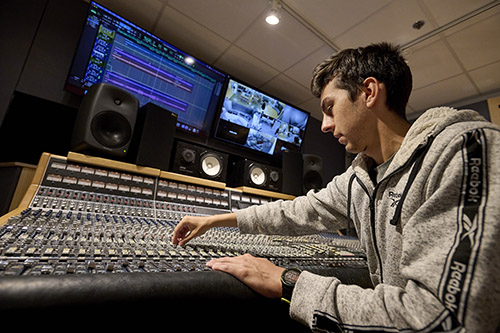
Synthesizers and Post-Production: How Sound Completes the Media You Love
Published on: February 9, 2023

Have you ever tried watching a movie or TV show with the sound off? To state the obvious, it's not the same. Think about Jaws. It's a classic, filled with suspense and horror. But cut the sound and some of the movie's most tense and memorable scenes are suddenly just footage of people splashing around in the ocean.
It's sound – the music and effects – working in conjunction with the imagery that creates the suspense that makes Jaws so memorable. The job of adding that sound to movies, TV, video games and more, most often falls to people who work in one particular area of audio engineering: post-production.
Audio engineering... post-production... what are those?
As the name implies, audio engineering is a vast field dedicated to the recording of music and sound. While musical knowledge is certainly a benefit for those in this field, in practice it's different than being a traditional musician. Rather, it's a much more scientific and technical field, focused on recording, mixing and all the other processes that go into making recorded sound, well, sound good.
Within the broader field of audio engineering, there are three unique concentrations. Live sound production is focused on all the systems, technology and physics of live sound. A live sound production professional is responsible for making sure the audio you hear at a concert is loud, clear and balanced. Music production, on the other hand, focuses on the recording of music, typically in a studio setting. When you're listening to a song on Spotify, a music production professional has recorded it and likely had a hand in the arranging of the piece.
That finally brings us to post-production.
Post-production covers the addition of sound and music to a wide range of media, including movies, TV, video games, virtual reality and more. A post-production sound professional may be responsible for adding key sound effects to a film, creating and recording a musical score, and even mixing the sound in a completed production so everything is just the right volume to serve the overall piece.
Using synthesizers to bring media to life
While post-production sound professionals use a variety of tools to add sonic elements to different products, synthesizers are a particularly useful tool. In short, synthesizers are electronic musical instruments that can synthesize a wide range of sounds and frequencies. Typically, though not always, they resemble pianos and keyboards.
Some synthesizers are designed to perfectly mimic other sounds; others can sample (or record) live sounds and then lets the user manipulate and change that sound using the instruments. Other synthesizers are prized specifically for the synthetic quality of the sounds they make. The famed Roland TR-808 drum machine synthesizer, for example, was initially a poor seller for its manufacturer but eventually became an iconic sonic building block in the history of hip-hop because of its distinctive sonic qualities.
For post-production professionals, synthesizers serve a variety of purposes. Science fiction films have long used these electronic instruments to create futuristic soundscapes and effects. Other productions create entire musical scores on the synthesizer. While in some cases, they simply served as a cheaper and simpler alternative to full orchestral scores, composers sometimes use the distinct sounds of synthesizers for dramatic effect. The synth-driven musical score of the show Stranger Things is a good example: the synthesizer music evokes danger and urgency, a sense of nostalgia, and a certain otherworldliness. It simply wouldn't be as effective if played on traditional instruments.
The benefits of synthesizers for post-production sound engineers are plentiful. For one, they are highly adaptable and offer a wide range of sonic options for the post-production artist to work with. Whatever sound or soundscape needs to be created, there is almost certainly a synthesizer that can create it. (A dedicated synth player could also create their own instrument to meet their needs, like famous engineer Robert Moog did.)
More importantly, with synthesizers, a skilled player or sonic technician can create the sounds they hear in their mind entirely on their own. Whatever idea you have, no matter how complex or outlandish, can be pieced together using this technology. No need to try to explain a complex movement to an orchestra or worry that a drummer can't maintain a beat: with synthesizers, it can all be created, piece by piece from the comfort of your office or recording space. (That's not to say that post-production doesn't require collaboration: in this role, you'll frequently need to work closely and collaboratively with the work's creators.)
Develop the skills to be a post-production pro at Husson!
Of course, as easy as synthesizers makes the creation process, bringing your composition or soundscape to life with synthesizers does require some skill. Fortunately, you can begin building your expertise in that area in Husson University's Audio Engineering program, within its New England School of Communications.
All students in the program will have the opportunity to get hands-on experience with a variety of synthesizers, and will learn not only to how to use these instruments for a variety of purposes, but will also delve into the physics and science of sound to better understand how it all works. Students who choose to focus on the post-production concentration will get even more experience creating sound for other media, learning about everything from Foley effects to ADR to soundtrack composition.
So request info about the program or apply today. You'll graduate with the skills you need to take a movie (or show or video game or whatever the future of media holds) from an interesting collection of images into something truly unforgettable.
Back to All Articles